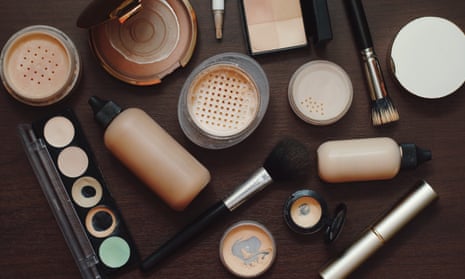If you’re on TikTok, you’ll know Gen Z can tell if you’re a millennial from a side part and skinny jeans. Now, a new TikTok trend suggests teenagers on the app know someone’s political standing from the way they use eyeliner.
Dubbed the “Republican-sona” makeover, Gen Z is creating their “conservative alter egos” to the ironic soundtrack of “God Made Girls” by RaeLynn.
According to the trend, which started as a way to lightheartedly mock conservatives, Republicans overuse an orange foundation shade, powder their face, conceal their lips and apply thick eyeliner. The makeovers have been adapted into a masc version and a fake couple edition, where two friends created Melissa and Tanner, their mask-avoiding, engaged, alter egos.
This article includes content provided by TikTok. We ask for your permission before anything is loaded, as they may be using cookies and other technologies. To view this content, click 'Allow and continue'.
While the videos are clearly poking fun at poorly applied makeup, the song choice suggests a dig not only at conservative viewpoints but at larger patriarchal standards for women.
It’s also not the first time users of the video-sharing app have utilized makeup as a tool for political discussion. In 2019, a makeup video went viral after containing a call to action of China’s treatment of Uighurs. More recently, a makeup video filmed to the soundtrack of Alexandria Ocasio-Cortez’s response to offensive comments made by Representative Ted Yoho also went viral.
In response to the “Republican-sona” trend, some rightwing TikTok users created an alternative “liberal-sona” trend, which usually involves looking like an e-girl, having colorful hair and contouring the tip of your nose.
This article includes content provided by TikTok. We ask for your permission before anything is loaded, as they may be using cookies and other technologies. To view this content, click 'Allow and continue'.
With many of the makeovers done by people not old enough to vote yet, the comment sections can get heated. “Y’all wanna take our rights away but are crying over a TikTok trend,” wrote one user, directed at conservatives on the app. “I haven’t seen one Republican do good makeup,” wrote another.
Considering the app has a large issue with transphobia and harassment, the trend is by no means bullying. It is, however, diluting the actual political message, says one user. In a video explaining why she isn’t interacting with the trend, she said: “I think the problem that I have is that it feels a lot more like taking the mick out of these girls for what they look like as opposed to their political views.” This, says the user, is “rebranding internalized misogyny as activism” and becomes more problematic when white creators create a stereotype of bigotry in order to distance themselves from it.
Ioana Literat, assistant professor of communication, media and learning technologies at Columbia University, studies how TikTok is shaping the political conversation. Literat began her research on the app with the hope that pop culture could bring people with opposing viewpoints together, but says her findings are less encouraging.
“Even though there’s a lot of potential, in practice it’s still very polarized,” she says. “Although this trend is tongue-in-cheek and sarcastic, which is in line with the spirit of the platform, it does show just how divided our society is and also how obvious these divisions are in the eyes of Gen Z. This polarization is seemingly insurmountable.”
Literat says that social media are becoming more explicitly political across platforms but this isn’t translating to more engaged or nuanced conversations across political lines. However, the opportunity for young people to talk about politics, find community or express themselves politically in creative ways, she says is encouraging. “Politics used to be off the table but, for Gen Z, activism is part of who they are and so we’re seeing their political stances unapologetically front and center.”
Turns out the next time you’re using blush or choosing your shade of foundation, you’re also partaking in the concerning political divide.
